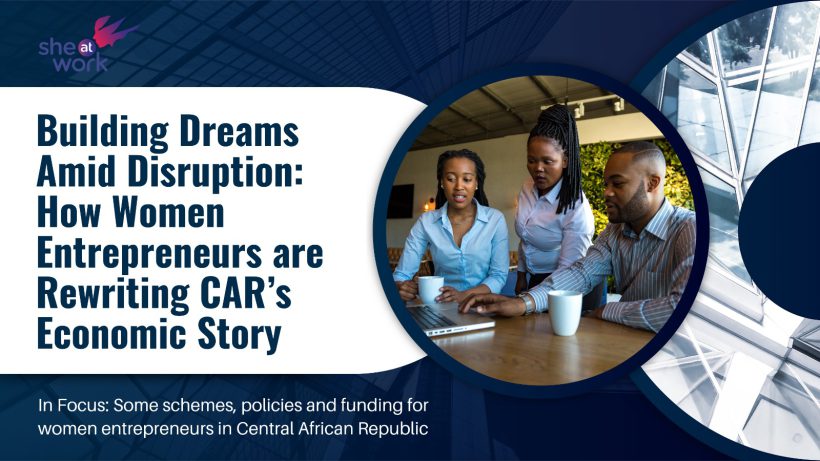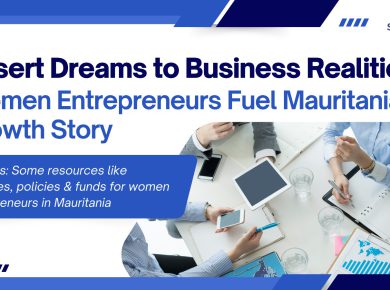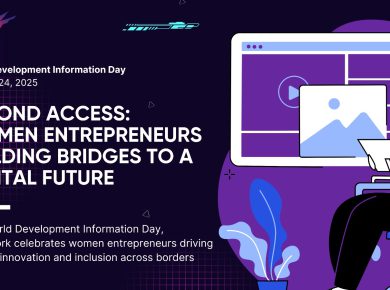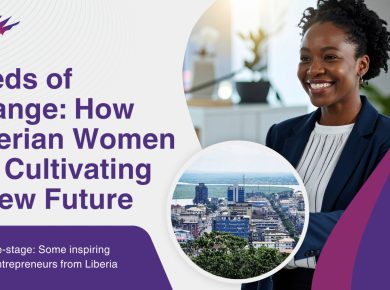In Focus: Some schemes, policies and funding for women entrepreneurs in Central African Republic
#WomenLeadChange #EntrepreneurshipInAfrica #EmpowermentInAction #CARBusiness #WomenBuildingAfrica
Women entrepreneurs in the Central African Republic (CAR) are gradually emerging as vital contributors to local economies, even amid the nation’s ongoing political and economic instability. Despite limited domestic infrastructure and institutional support, women in CAR are turning to entrepreneurship as a means of resilience—creating livelihoods, supporting their families, and driving small-scale innovation. However, the absence of robust local financing systems and training programs continues to pose significant challenges.
The Untold Story of CAR’s Women Entrepreneurs
To bridge these gaps, international and pan-African initiatives have become key lifelines. Programs such as the African Women’s Development Fund (AWDF), UN Women’s Empowerment Projects, and the Women Entrepreneurs Finance Initiative (We-Fi) provide mentorship, seed funding & access to regional networks that empower women to scale their ventures. The African Development Bank’s Affirmative Finance Action for Women in Africa (AFAWA) initiative also extends vital financial inclusion and capacity-building support to women entrepreneurs in CAR, promoting sustainability and innovation across various sectors.
While the path forward remains challenging, the persistence of women entrepreneurs in CAR – and the growing web of regional and international resources supporting them -signals a quiet yet powerful movement toward economic independence, gender equality, and inclusive growth in one of Africa’s most fragile states.
Let us now look at some initiatives, policies and funding available to women entrepreneurs in Central African Republic (CAR).
- Affirmative Finance Action for Women in Africa (AFAWA)
This is a flagship programme from the African Development Bank Group (AfDB) which tries to address the $42 billion financing gap for women entrepreneurs in Africa.
AFAWA provides financing through financial instruments such as lines of credit and equity investments and also offers a risk-sharing mechanism, the AFAWA Guarantee for Growth (G4G), to reduce collateral requirements.
- Women Entrepreneurs Finance Initiative (We-Fi)
Led by the World Bank, this initiative provides a number of facilities like – financial products and services, capacity-building, networks, and mentorship to women entrepreneurs in developing economies.
The Women Entrepreneurs Finance Initiative (We-Fi) supports women entrepreneurs – by scaling up access to financial products and services, building capacity, expanding networks, offering mentors, and providing opportunities to link with domestic and global markets.
- Women Entrepreneurship for Africa (WE4A)
WE4A is a joint initiative by the European Union, the Organisation of African, Caribbean and Pacific States, and the German government.
The “Women Entrepreneurship for Africa” (WE4A) action is a partnership jointly supported by the European Union (EU), the Organisation of African, Caribbean and Pacific States (OACPS) and the German Federal Ministry for Economic Cooperation and Development (BMZ) and is implemented by the Tony Elumelu Foundation (TEF), the Employment and Skills for Development in Africa (E4D) programme of the Deutsche Gesellschaft für Internationale Zusammenarbeit (GIZ) and the Seedstars Association for Entrepreneurship in Emerging Markets (SAFEEM).
WE4A provides – grant funding, technical assistance, mentorship & networking opportunities for women entrepreneurs in Sub-Saharan Africa.
WE4A provides African women entrepreneurs – with enhanced business capacities, access to formal financial services and better market opportunities as well as helps them to integrate into local, regional and international value chains.
Consequently, WE4A builds on the existing Tony Elumelu Foundation Entrepreneurship programme and combines the initial entrepreneurship training and seed capital with support through local entrepreneurial ecosystems as well as support to grow and access second stage financing. WE4A combines the expertise of the partners to create a pathway to success for women entrepreneurs in Sub-Sahara Africa.
https://www.giz.de/en/downloads/giz2023-en-factsheet-WE4A.pdf
- She Wins Africa
She Wins Africa is an International Finance Corporation (IFC) programme – designed to help women-led startups overcome hurdles like limited access to capital and support networks.
The programme includes training for investment readiness, skills capacity building, and matchmaking events to connect women founders with investors.
The SheWINS Africa initiative aims at supporting 100 women-led startups through increasing their access to financing and capacity building. This would be achieved through delivering an “Investment Readiness and Capital raising” training to 100 female-led startups/enterprises and enhancing their access to financing opportunities. The series of the SheWINS Africa training/activities will culminate in a Pitch Competition, which will serve as a platform to showcase Africa’s promising trained female startups and enterprises as well as provide networking and pitching opportunities for these women-led startups and enterprises with Seedstars’ network of investors.
https://www.seedstars.com/community/entrepreneurs/programs/she-wins-africa
- The Tony Elumelu Foundation (TEF) Entrepreneurship Programme
The Tony Elumelu Foundation (TEF) Entrepreneurship Programme is a leading philanthropic initiative that empowers African entrepreneurs across all 54 countries.
TEF provides a number of services like – training, mentorship, and seed capital to help scale businesses.
- The African Women Entrepreneurship Cooperative (AWEC)
The African Women Entrepreneurship Cooperative (AWEC) is a 12-month programme that builds the capacity of female entrepreneurs – through leadership and business management training delivered through a blended-learning model.
The African Women Entrepreneurship Cooperative (AWEC) builds the capacity of women entrepreneurs to enable resilient business growth. They develop innovative, applied, and collaborative learning experiences that create immediate and long-term business impact for more than 800 small and mid-sized enterprises across Africa.
Their flagship programme is – a high-touch blended learning model that leverages technology to deliver world class leadership and business management learnings to entrepreneurs in 52 African countries.
https://www.thecge.net/institutes-initiatives/african-women-entrepreneurship-cooperative
- ILO’s Women’s Entrepreneurship Development (ILO-WED) programme
What is special is that ILO’s Women’s Entrepreneurship Development (ILO-WED) programme helps women start, formalize, and grow their businesses by addressing structural barriers, including advocating for inclusive policies and improving access to markets.
Local-level initiatives in the Central African Republic
In the CAR, programmes are often focused on post-conflict recovery and foundational empowerment for women and girls.
The ILO’s Women’s Entrepreneurship Development (ILO-WED) programme supports women – to start, formalize, sustain and grow their businesses by addressing the structural barriers that limit their opportunities. Anchored in a transformative approach, ILO-WED works across multiple levels to tackle harmful social norms, advance inclusive policies and regulations, and improve access to markets, support services and decent work.
Having worked in close to 70 countries, ILO-WED promotes women’s entrepreneurship as a pathway to advancing gender equality and women’s empowerment for decent work and inclusive economic growth.
- World Bank Empowerment Project (IDA Grant)
The background is that in 2021, the World Bank approved a grant to strengthen human capital and empower women and girls in the Central African Republic (CAR).
The project aims to improve access to health, education & job opportunities for women and adolescent girls in targeted areas.
The International Development Association (IDA) is a part of the World Bank that focuses on assisting low-income countries. Established in 1960, IDA complements the World Bank’s original lending arm, the International Bank for Reconstruction and Development (IBRD). Today, it comprises 175 member countries. IDA provides grants and low-interest loans that help countries invest in their futures, improve lives, and create safer, more prosperous communities worldwide. It is one of the largest sources of assistance for the 78 low-income countries and the single largest source of donor funds for essential social services in these nations.
https://ida.worldbank.org/en/about
- Bêkou Fund for Socio-economic Initiatives
This European Union fund – Bêkou Fund, supports various socio-economic empowerment initiatives to help vulnerable women, including survivors of gender-based violence, get back on their feet.
The Bêkou Fund was the first multi-donor EU Trust Fund and it was established in 2014 – to support the recovery and stabilization of the Central African Republic (CAR) following its civil war. The name “Bêkou” means “hope” in the Sango language of the CAR. The fund was designed to address the needs of a country transitioning from humanitarian emergency to long-term development.
- Government Initiatives for Gender Equality
Through the Department for the Advancement of Women, the CAR government has historically worked with technical ministries, the private sector, and civil society to coordinate gender and development activities.
- Microfinance Institutions (MFIs)
While information on current specific microfinance schemes is limited, earlier reports indicate that MFIs have operated in the country, providing small loans and financial services, particularly to women’s groups in rural areas.
- Some Policies – Government & International available in CAR
Central African Republic (CAR) has policies that supports women entrepreneurs. But unfortunately, the implementation faces significant challenges due to ongoing instability and institutional weaknesses. Key frameworks include – gender equality legislation, sectoral strategies, and internationally supported projects that aim to improve access to resources and training.
National legal and policy framework
- National Policy for the Promotion of Equity and Equality (2005): This policy laid the groundwork for mainstreaming gender equality into national policies and programs.
- Law No. 16.004 (2016): This law mandates gender parity in public, semi-public, and private employment and decision-making bodies, a commitment that remains challenging to enforce.
- National Gender and Climate Change Strategy (NGCCS) 2023–2030: The NGCCS aims to integrate gender into climate policies and emphasizes gender-responsive approaches, especially for vulnerable populations.
- Family Code (1998): This code and the Code de Protection de l’enfant (2020) set the legal minimum age for marriage at 18, which helps combat practices that limit girls’ futures and economic potential.
- Constitutional protections: The 2016 constitution guarantees equal employment rights for all citizens, explicitly prohibiting discrimination based on sex.
- Ministry of the Family, Social Affairs and National Solidarity: This Ministry, through its Department for the Advancement of Women, is the main government body tasked with initiating and coordinating gender and development activities.
- Promising Sectors Development and Youth Women Entrepreneurship Promotion Support Project in the Agribusiness Sector (PADFP-PEJA):
Co-funded by the African Development Bank, this 2024 project aims to boost agricultural production, reduce poverty, and promote youth and women’s entrepreneurship in the agribusiness sector. - The World Bank and IDA: Through its International Development Association, the World Bank provides grants and zero-interest loans for projects aimed at boosting economic growth and reducing poverty, with a particular focus on empowering women and girls.
- Department for the Advancement of Women: This department, which is part of the Ministry of the Family, Social Affairs, and National Solidarity, is responsible for initiating and coordinating gender activities. It works in collaboration with the private sector and civil society to support women’s empowerment.










